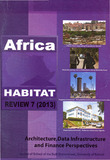| dc.description.abstract | Cities have a significant impact on the economy and development of any given nation. In particular, they offer a
place to live. They have proved to be dense networks of interchanging investments, information, goods and people
as well as centres of innovation and knowledge management. However, as the 21st century continues to unfold,
it is apparent that Ugandan cities are wallowing in a divided set of visions between developmental perspectives
of globalization and those of regionalism. In this dichotomy of global and regional visions, this paper provides a
historical and contemporary perspective of those competing paradigms and their impacts on these cities through
a case study on Kampala and Jinja. Through this study, the paper endeavours to establish the most strategic
pathway for Uganda cities from the viewpoint of sustainable urban development and all-inclusive welfare. Such
a pathway cannot be easily agreed upon by everybody. The philosophy behind the paper is that in the clash
between global and regional visions of architectural and/or urban transformation, it is practicable to distinguish a
recipe and way forward for sustainable development for the region's cities in the best interest of its people. Such a
recipe would accommodate local architecture-centred socio-cultural, economic, political, environmental, and ecodevelopmental
priorities of the region unlike the past in which foreign dictates were the order of the day | en_US |



